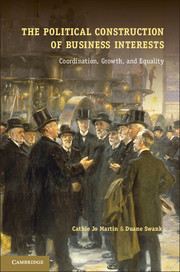Book contents
- Frontmatter
- Contents
- Figures
- Tables
- Acknowledgments
- Introduction
- 1 Collective Political Engagement and the Welfare State
- 2 The Political Origins of Coordinated Capitalism
- 3 Party Conflict and the Origins of Danish Labor Market Coordination
- 4 British Experiments in National Employers’ Organization
- 5 Sectional Parties and Divided Business in the United States
- 6 The Origins of Sector Coordination in Germany
- 7 Twenty-First Century Breakdown? Challenges to Coordination in the Postindustrial Age
- 8 Institutional Sources of Employers’ Preferences for Social Policy
- 9 Employers, Coordination, and Active Labor Market Policy in Postindustrial Denmark
- 10 Employers and Active Labor Market Policy in Postindustrial Britain
- 11 The Failure of Coordination and the Rise of Dualism in Germany
- 12 The Political Foundations of Redistribution and Equality
- Conclusion Social Solidarity after the Crisis of Finance Capitalism
- Bibliography
- Index
6 - The Origins of Sector Coordination in Germany
Published online by Cambridge University Press: 05 June 2012
- Frontmatter
- Contents
- Figures
- Tables
- Acknowledgments
- Introduction
- 1 Collective Political Engagement and the Welfare State
- 2 The Political Origins of Coordinated Capitalism
- 3 Party Conflict and the Origins of Danish Labor Market Coordination
- 4 British Experiments in National Employers’ Organization
- 5 Sectional Parties and Divided Business in the United States
- 6 The Origins of Sector Coordination in Germany
- 7 Twenty-First Century Breakdown? Challenges to Coordination in the Postindustrial Age
- 8 Institutional Sources of Employers’ Preferences for Social Policy
- 9 Employers, Coordination, and Active Labor Market Policy in Postindustrial Denmark
- 10 Employers and Active Labor Market Policy in Postindustrial Britain
- 11 The Failure of Coordination and the Rise of Dualism in Germany
- 12 The Political Foundations of Redistribution and Equality
- Conclusion Social Solidarity after the Crisis of Finance Capitalism
- Bibliography
- Index
Summary
Introduction
Despite the influential estate tradition in conceptions of German society, the organization of employers is significantly weaker in Germany than in Denmark. Multisectoral encompassing peak associations are limited in both collective bargaining and policymaking, and coordination transpires at the lower level of the industrial sector. The peak associations are functionally divided, with one set devoted to industrial relations and another to political negotiations and intraindustry collaboration. Moreover, the state plays a virtually nonexistent role in institutions for nonmarket coordination but delegates authority over collective bargaining, finance-producer relations, and the provision of collective business goods to the labor market partners. Of course, the German political economy and institutions for coordination have varied tremendously across profoundly different epochs. To grasp fully the ongoing revisions of the German model, one must explore the specific historical context at critical junctures, emergent political coalitions that capture and convert older forms for shifting purposes, and the evolution of German managerial control. Yet postwar business institutions share significant features with those of the Weimar Republic, and we seek to understand how sector coordination was created and renegotiated across the changing political landscape.
We argue that the structure of political competition shaped the collective articulation of business interests before and after World War I: German sectoral coordination reflects the political dimensions of multiparty competition within a federal government. Both the predemocratic elite parties and Weimar parties specialized in regions and were weakly developed at the national level; thus, no national party held most employers. Federalism reinforced regional economic diversity, sustained high levels of regional (especially Prussian) legislative power vis-à-vis the national Reichstag and made it easier for industry groups (often with pronounced regional identities) to retain power at the sectoral level. The first wave of multisector groups created by the authoritarian state to compensate for the deficiencies of ineffectual, decentralized parties and the later industrial relations associations had different purposes. Absence of a robust national business party combined with employers’ disgruntlement with state interventions in industrial relations during Weimar (and the Third Reich) encouraged business to resist state interference in labor market negotiations. All of these contributed to torpid peak multisector associations and stronger sector coordination.
- Type
- Chapter
- Information
- The Political Construction of Business InterestsCoordination, Growth, and Equality, pp. 109 - 127Publisher: Cambridge University PressPrint publication year: 2012

